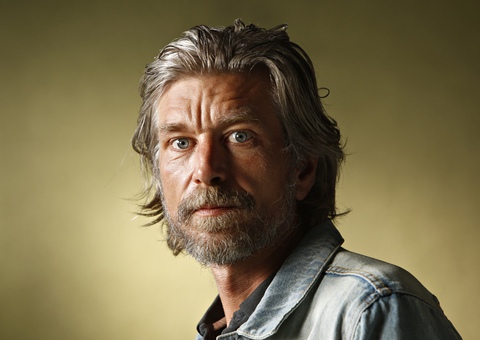And so seven years after its publication in Norway, the sixth and final part of Karl Ove Knausgaard’s My Struggle series finally reaches British bookshops. Why it’s taken this long is unclear, though the fact that the 1,168-page tome has an additional translator (Martin Aitken) alongside Don Bartlett, who worked on the previous five alone, may just have something to do with it.
In any case, the fittingly titled The End is worth the wait. Reimmersing myself in Knausgaard’s distinctive preoccupations, I wondered at first if I had lost the magnetic thread, that strange compulsion in the Norwegian’s sprawling prose that pulls the reader through epic sprees of navel-gazing. What more could he say about himself and his literary anxieties? With how many more cigarettes and cups of coffee could he fill his descriptions of quotidian life?
The answer to all those questions, it turns out, is a lot. Knausgaard had written two volumes of My Struggle and was about to start work on the third, when the first – A Death in the Family – came out. Here, in the sixth, he records in what can only be called Knausgaardian detail the family feud and authorial crisis unleashed by that initial publication.
His uncle accused him of making things up in the novel. That wouldn’t normally be a charge that would trouble a fiction writer. However, in this case, the author had set his heart on writing the “truth”, not just the emotional version of it, but also the factual, the real version. “The whole point of the novel,” he writes, “was to depict reality as it was.”
And the uncle’s insistence that Knausgaard had invented material to embellish his story (later shown to be a false accusation) made him question his own memory and motivations, which in turn caused a kind of crippling ontological doubt.
That and the intense public scrutiny to which the book was subjected in Norway led Knausgaard, by his own account, to be more restrained – and therefore less truthful – in volumes three, four and five. But in The End, he proclaims, he is determined to tell things as they are, regardless of the social costs.
One aspect of this renewed boldness is a 400-page essay on the life, thoughts and appeal of Adolf Hitler. Where does that fit in with the travails of a novelist father of three living in Malmö, you might ask.
Not seamlessly, although Knausgaard did borrow the title of his series from the Nazi leader’s notorious memoir. More significantly, the Norwegian is an avowed romantic, someone who feels uncomfortable with the rationalised pieties and hypocrisies of a modern society that extol the values of equality while egregiously privileging the inequalities of physical beauty. Repulsed by media saturation and ceaseless commercialisation, he yearns for the authentic, the essential, the transcendent.
He’s not the first Nordic writer to do so. It’s the mainspring of German romanticism, this profound yearning, and somewhere within it is the purifying desire on which Hitler built his ultra-nationalistic cult, supported by many who should have known better, including the towering mind of the philosopher Martin Heidegger. Knausgaard explores this intellectual tradition and seeks to understand how a craving for authenticity resulted in industrialised genocide and the greatest horrors of the 20th century.
It makes for an intense and demanding section, but I’d question whether Hitler and the Holocaust are subjects best suited to Knausgaard’s promiscuous intellect. For all his close reading of Hitler and various historians – his critique of Ian Kershaw’s work is more than an intriguing footnote – he never really gets to grips with the source or growth of the dictator’s demented antisemitism.
Perhaps the scale of the undertaking is too great to be contained within a narrative of a writer’s struggle. The provocative irony of the title becomes, instead, a comparative study of two alienated young men – one who goes on to write a critically acclaimed international bestseller and the other to be responsible for the deaths of tens of millions.
No amount of thoughtful analysis can square that imbalance. Yet Knausgaard is to be applauded for showing that the great mystery of the modern era – the descent of Germany into genocidal madness – is not a “they” but a “we” issue, even if it’s an argument that loses some of its force within the context of a resolutely “I” book.
And never is that “I” more emphatically announced than in Knausgaard’s auto-criticism of his auto-fiction and, in particular, its real-life consequences for other people. It makes for a weird kind of feedback loop in which the author berates himself for his previous intrusions into others’ privacy while simultaneously trespassing once again.
The most disturbing example is with Linda, his second wife, about whom he wrote in often negative terms in volume two, A Man in Love. Bipolar, with three young children, and struggling with a chronic lack of confidence as a writer herself, Linda suffers a breakdown and ends up in a psychiatric hospital. Yet as he castigates himself for the insensitivity of his earlier depictions of her, Knausgaard once again submits his wife to his unflattering gaze, creating a picture of an indolent, clinging woman steadily cutting off his freedom and stifling his creativity.
That he subsequently declares that she is “a human being and her unique essence is indescribable” doesn’t lessen the damning nature of the portrait. For he has described her. You come away from the book with a powerful image of the ambitious artist trapped in a suffocating marriage, even as Knausgaard dutifully interrogates the meaning of ambition, art and marriage.
Should the fact that the relationship ended a couple of years ago inform our reading of this book? Does that knowledge affect our appreciation of Knausgaard’s heroic attempt to get at the unvarnished experience of life as it is lived? It’s the sort of question on which he could probably hold forth for 20 paragraph-less pages.
As Knausgaard is at pains to acknowledge, the complexity of life will always remain beyond the scope of even its most scrupulous documenter. Yet whatever distinctions one chooses to draw between an experience and its faithful, if inevitably subjective, depiction (and ultimately our minds process both as stories), life and art will always bleed into each other.
If it’s just about conceivable that the reader might remain incurious, or at least ignorant, of the writer’s biography outside the text, there seems little doubt that that biography has been dramatically altered by the impact of the text – both in terms of fame and familial fallout.
Writing about life, as Knausgaard notes, was his means of escaping from life. But the more he writes about his life, the more he is imprisoned by the self-consciousness that the endeavour demands and – through widespread public attention – supplies.
By the end of the book, we can feel his growing desperation to be done with the task, to escape back to real life. He promises on the final page that he will never “do anything like this” to Linda and the children again. Whatever the truth of those words, his life is now destined to stand in the shadow of this truly monumental six-volume literary achievement. And perhaps there is no greater mark of artistic success than that.
• The End by Karl Ove Knausgaard is published by Harvill Secker (£25). To order a copy for £21.25 go to guardianbookshop.com or call 0330 333 6846. Free UK p&p over £10, online orders only. Phone orders min p&p of £1.99











